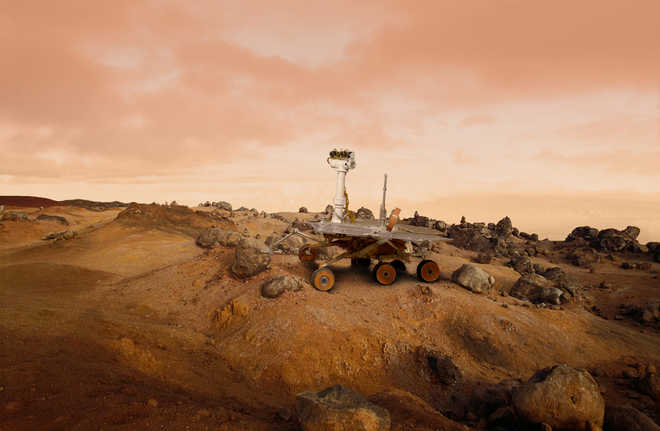
Photo Source: Thinkstock
Washington
NASA's Curiosity rover has discovered an unexpected mineral in a rock sample on Mars, a finding that suggests the red planet hosted explosive volcanoes during its evolution.
The Mars Science Laboratory rover, Curiosity, has been exploring sedimentary rocks within Gale Crater since landing in August 2012.
In July last year, on Sol 1060 (the number of Martian days since landing), the rover collected powder drilled from rock at a location named "Buckskin”.
Analysing data from an X-ray diffraction instrument on the rover that identifies minerals, scientists detected significant amounts of a silica mineral called tridymite.
Tridymite is generally associated with silicic volcanism, which is known on Earth but was not thought to be important or even present on Mars, researchers said.
The discovery of tridymite might induce scientists to rethink the volcanic history of Mars, suggesting that the planet once had explosive volcanoes that led to the presence of the mineral.
"On Earth, tridymite is formed at high temperatures in an explosive process called silicic volcanism. Mount St Helens, the active volcano in Washington State, and the Satsuma-Iwojima volcano in Japan are examples of such volcanoes," said Richard Morris, NASA planetary scientist at Johnson.
"The combination of high silica content and extremely high temperatures in the volcanoes creates tridymite," said Morris.
"The tridymite was incorporated into 'Lake Gale' mudstone at Buckskin as sediment from erosion of silicic volcanic rocks," he added.
The findings will also stimulate scientists to re-examine the way tridymite forms.
Researchers examined terrestrial evidence that tridymite could form at low temperatures from geologically reasonable processes and not imply silicic volcanism. They found none.
They will need to look for ways that it could form at lower temperatures.
The study was published in the journal PNAS. — PTI



























